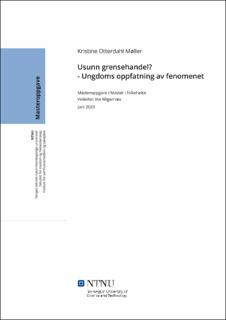| dc.contributor.advisor | Wigernæs, Ine | |
| dc.contributor.author | Otterdahl Møller, Kristine | |
| dc.date.accessioned | 2021-09-25T16:19:50Z | |
| dc.date.available | 2021-09-25T16:19:50Z | |
| dc.date.issued | 2020 | |
| dc.identifier | no.ntnu:inspera:58125597:34518935 | |
| dc.identifier.uri | https://hdl.handle.net/11250/2782772 | |
| dc.description.abstract | Bakgrunn: Hensikten med denne studien var å undersøke hvilken betydning grensenærhet til Sverige har for et utvalg ungdommer i Kongsvinger kommune i et folkehelseperspektiv. Kongsvinger kommune ligger en 40 minutters kjøretur fra Charlottenberg. Dette er en av de mest besøkte stedene for grensehandel blant nordmenn, etter Stömstad/Nordby/Svinesund. Med de folkehelseutfordringene kommunen står ovenfor tar denne studien sikte på å få svar på hvilken oppfatning et utvalg i Kongsvinger har av fenomenet. Hvor stor innvirkning tror de selv at grensenærhet påvirker helserelaterte valg?
Metode: For å gjennomføre studien ble det brukt kvantitativ metode. Hovedandelen av spørsmålene i denne studien ble hentet fra validerte spørreskjemaer, i tillegg til at veileder og masterstudent utviklet spørsmålene som omhandler grensehandel. Spørreskjemaene ble besvart i klassesituasjon av 18-åringer på studiespesialiserende utdanning. De to største videregående skolen i kommunen deltok på studien (N=151). Undersøkelsen ble gjort i samarbeid med en referansegruppe bestående av ansatte i Kongsvinger kommune.
Resultat: Resultatene viser at flertallet av utvalget mener det er smart og økonomisk å handle i Sverige. Ungdommene i Kongsvinger har et ambivalent forhold til dette temaet. Det er selvmotsigende svar i resultatene. Flertallet i utvalget er fornøyd med egen helse og familiens økonomi.
Konklusjon: I denne studien er det lite som tyder på at avstand til grensen har noen signifikant påvirkning på folkehelsen i kommunen. Resultatene viser at ungdommen i Kongsvinger har et ambivalent forhold til grensehandel. Bildet er svært sammensatt med tanke på sosioøkonomisk status og helseatferd. Den lave sosioøkonomiske statusen i Kongsvinger kommune blir utfordret av våre funn. Flertallet av ungdommen svarer mer positivt enn nasjonale data skulle tilsi. Dette kan gi et fremtidshåp for Kongsvinger kommune. Det er også stor kunnskapsmangel om hva som handles av nordmenn i Sverige, noe som kan reise flere spørsmål til omfanget av grensehandelen og begrunnelser for høye avgifter på tobakk, alkohol og sukker i Norge.
Nøkkelord: Grensehandel, Kongsvinger kommune, grensenærhet. | |
| dc.description.abstract | Background: Kongsvinger municipality wanted to investigate the significance of cross-border shopping to Sweden in a public health perspective. Kongsvinger is located 40 minutes to the Swedish border by car. Charlottenberg is one of the most visited towns for shopping abroad besides Stömstad/Nordby/Svinesund. Kongsvinger has negative public health indicators with respect to socioeconomic issues. With those in mind we have done a research to get a better understanding on the youth perception of this phenomenon. To which extent do the youth think living close to the Swedish border affects health related decisions?
Method: To conduct the study it is used a quantitative method. The majority of the questions used in this study is from validated questionnaires, in addition the tutor and master student made the cross-border shopping questions. The questionnaires were answered by 18-years-olds in the municipality. Students at two largest schools were part of the study (N= 151). The survey was done in cooperation with a reference group of staff members, because they were seeking to get more information about the cross-border shopping in Kongsvinger.
Results: The results points towards that the majority describes cross-border shopping as clever and economic. The subjects have an ambivalent relationship to the theme. There are contradictory answers in the results regarding their attitude. Contradictory to the previous established knowledge regarding socioeconomic expectations, the majority is satisfied with their own health and the economy in the family.
Conclusion: In this study there is little evidence that their perception of distance to the border has any major impact on public health in the municipality. The results show that the subjects have an ambivalent relationship towards cross-border shopping. The picture is very complex in terms of socioeconomic status and health behavior. The low socioeconomic status in Kongsvinger municipality can affect our results. The majority of the subjects is more positive in relation to health than the national data shows. This can reflect future directions for Kongsvinger municipality. There is also a great lack of knowledge about Norwegians cross-border shopping in Sweden, which raise more questions about the extent of the border shopping and the reasons for such high taxes on tobacco, alcohol and sugar in Norway.
Keywords: Shopping abroad, cross-border shopping, Kongsvinger municipality. | |
| dc.language | | |
| dc.publisher | NTNU | |
| dc.title | Usunn grensehandel?
- Ungdoms oppfatning av fenomenet | |
| dc.type | Master thesis | |
